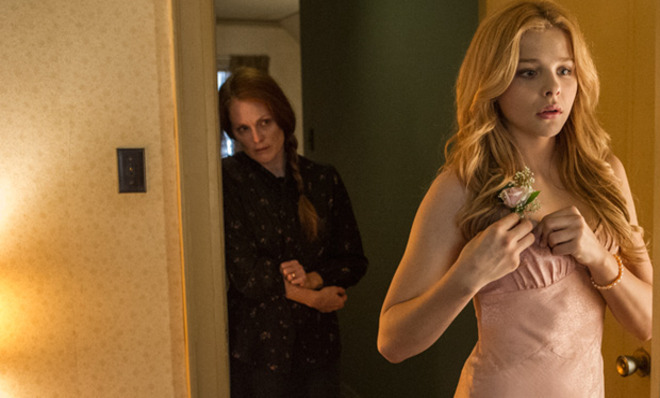Why moviegoers should be wary of 'viral video' campaigns
Hollywood studios are playing around with tactics to trick you into watching their advertisements. Don't fall for it.


A free daily email with the biggest news stories of the day – and the best features from TheWeek.com
You are now subscribed
Your newsletter sign-up was successful
If you've spent any time trawling the internet today, you might have stumbled across a "viral video" called "Devil Baby Attack." The video, which is designed to promote this Friday's upcoming release Devil's Due, features a string of unsuspecting New Yorkers encountering an unmanned baby carriage on the street. When they approach, a creepy-looking baby pops out. They scream, and then they laugh — and then, if all goes according to plan, you watch it all happen on YouTube.
And then you buy a ticket to Devil's Due on Friday.

"Devil Baby Attack" is an undeniably canny bit of marketing from Thinkmodo, a marketing company that trumpets its ability to "create effective viral video campaigns for brands." It's too early to get official numbers for how many people have already viewed "Devil Baby Attack," but we can look at a comparable case study: Thinkmodo's "Telekinetic Coffee Surprise," a similarly-pitched video designed to promote last October's Carrie remake. The most-watched version of the official Carrie trailer earned a little over 3.5 million views on YouTube. "Telekinetic Coffee Shop Surprise" — in which Thinkmodo staged a Carrie-like attack in a New York City coffee shop, then filmed the patrons' reactions — earned a whopping 52.7 million views.
The Week
Escape your echo chamber. Get the facts behind the news, plus analysis from multiple perspectives.

Sign up for The Week's Free Newsletters
From our morning news briefing to a weekly Good News Newsletter, get the best of The Week delivered directly to your inbox.
From our morning news briefing to a weekly Good News Newsletter, get the best of The Week delivered directly to your inbox.

You can't really fault Hollywood marketing teams for embracing this kind of "viral video," even if they have rendered the very concept of a "viral video" sort of meaningless — why don't we have a better word to describe a "viral video" that hasn't, you know, had the chance to go viral yet?
What's more troubling is the fact that so many media outlets are willing to play along with them. Like "Telekinetic Coffee Shop Surprise," "Devil Baby Attack" doesn't identify itself as a promotional video for Devil's Due until the very end. But most of the outlets writing about the "Devil Baby Attack" — including Fast Company and Laughing Squid — don't make it clear in their headlines that the video is essentially a glorified advertisement. Yahoo Movies, which touts the video as an exclusive and features an interview with its creators, fails to identify "Devil Baby Attack" as a piece of marketing in their headline, and first references Devil's Due in the second paragraph, after the video embed. On a journalistic level, this is at best ethically dubious, and at worst an unlabeled advertorial — but the lure of an easy hit that's been pre-sold as "viral" was apparently too much to resist.
Which leads to another logical question: YouTube views aside, who benefits here? "Telekinetic Coffee Shop Surprise" was a hit for both Thinkmodo and the dozens of websites that wrote a quick story on it, but Carrie itself earned so-so reviews and a mediocre box-office. Devil's Due is almost certain to be profitable — if only because its no stars, found-footage aesthetic keeps production costs at an absolute minimum. But will "Devil Baby Attack" really convince anyone who wasn't interested in Devil's Due to give it a second look?
Allow me to leave you with one last cautionary tale: What happens when this kind of so-called viral marketing doesn't go viral. In an attempt to promote 2009's I Love You, Beth Cooper, marketing executives for 20th Century Fox paid high school valedictorian Kenya Mejia $1,800 to profess her love for a fellow student during her speech — a carefully staged "confession" that happened to echo the opening scene of the upcoming movie. Unfortunately for Fox, the clip failed to go viral, earning fewer than 2,000 views in the month after it was posted. The school's superintendent called the decision to embed a marketing campaign into a high-school graduation ceremony "unfortunate." In the end, not even that controversy could bump up the box-office numbers, and I Love You, Beth Cooper bombed at the box-office.
A free daily email with the biggest news stories of the day – and the best features from TheWeek.com
I wish I could show you the clip of Mejia's valedictorian speech, but I can't. In the wake of the failure, 20th Century Fox quietly scrubbed their would-be "viral video" from the internet altogether.
Scott Meslow is the entertainment editor for TheWeek.com. He has written about film and television at publications including The Atlantic, POLITICO Magazine, and Vulture.
-
 Secured vs. unsecured loans: how do they differ and which is better?
Secured vs. unsecured loans: how do they differ and which is better?the explainer They are distinguished by the level of risk and the inclusion of collateral
-
 ‘States that set ambitious climate targets are already feeling the tension’
‘States that set ambitious climate targets are already feeling the tension’Instant Opinion Opinion, comment and editorials of the day
-
 Mixing up mixology: The year ahead in cocktail and bar trends
Mixing up mixology: The year ahead in cocktail and bar trendsthe week recommends It’s hojicha vs. matcha, plus a whole lot more
